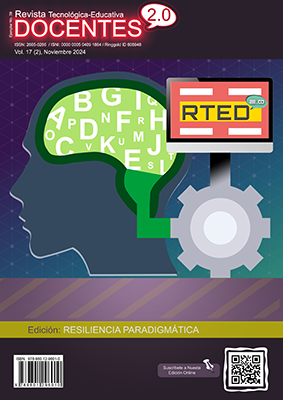Innovative Strategy to address Sexualities and Eroticism: Art Galleries with University Students
 DOI:
https://doi.org/10.37843/rted.v17i2.538
DOI:
https://doi.org/10.37843/rted.v17i2.538
Main Article Content
Abstract
The approach to human sexuality is controversial, as stated in previous research that sought to address some themes of sexuality, art, and education. The present study explored the potential of art and artistic expressions as an innovative methodological strategy to address sexuality and eroticism in university settings. The research was based on the action research method, adopting a humanistic paradigm with a qualitative approach, narrative design, interpretive type, and longitudinal section. Participants were students from University 1 and University 2, actively involved in seven intervention versions. Data collection techniques included field diaries and semi-structured interviews. Each intervention version presented distinctive characteristics, generating great proposals and learning for participants and gallery visitors. Various reactions, attitudes, and behaviors were observed and documented through interviews and observation records. The intervention reached 50 students and a population of 1,750 people, including the virtual version. The study demonstrated the effectiveness of art and artistic expressions as an innovative methodological strategy to address sexuality and eroticism in university environments. This strategy promotes social interaction, motivation for artistic creation, and sexual education in a creative and accessible way.
Downloads
Metrics
Article Details

This work is licensed under a Creative Commons Attribution-NonCommercial-NoDerivatives 4.0 International License.
Those authors who have publications in our journal accept the following terms:
- When a work is accepted for publication, the author retains rights of reproduction, distribution of his/her article for exploitation in all countries of the world in the format provided by our magazine and any other magnetic medium, optical, and digital.
- Authors will retain their copyright and guarantee the journal the right first to publish their work, which will be simultaneously subject to the Creative Commons Acknowledgment License (Attribution-NonCommercial-NoDerivatives 4.0 International (CC BY-NC-ND 4.0)). That allows third parties to copy and redistribute the material in any medium or format, under the following conditions: Acknowledgment - You must properly acknowledge authorship, provide a link to the license, and indicate if any changes have been made. You may do so in any reasonable way, but not in a way that suggests you have the licensor's endorsement or receive it for your use. NonCommercial - You may not use the material for a commercial purpose. NoDerivatives - If you remix, transform, or build from the material, you cannot broadcast the modified material. There are no additional restrictions - You cannot apply legal terms or technological measures that legally restrict you from doing what the license allows.
- Authors may adopt other non-exclusive license agreements to distribute the published version of the work (e.g., deposit it in an institutional archive or publish it in a monographic volume) provided that the initial publication in this journal is indicated.
- Authors are allowed and recommended to disseminate their work through the Internet (e.g., in institutional telematic archives, repositories, libraries, or their website), producing exciting exchanges and increasing the published work's citations.
- Request of withdrawal an article has to be done in writing by the author to the Editor, becoming effective after a written response from the Editor. For this purpose, the author or authors will send correspondence via e-mail: [email protected].
- The author will not receive financial compensation for the publication of his work.
- All Docentes 2.0 Journal publications are under the Open Journal System (OJS) platform at: https://ojs.docentes20.com/.
References
Balbuena, H. Fuentes, M., & Cáceres, M. (2019). El arte como herramienta para la educación integral. Revista para el aula, 41. https://n9.cl/n88iz
Barrantes, R. (2014). Investigación: Un camino al conocimiento, Un enfoque Cualitativo, cuantitativo y mixto. EUNED
Balcazar, F. E. (2003). Investigación acción participativa, aspectos conceptuales y dificultades de implementación, Redalyc, Fundamentos en humanidades IV. Universidad Nacional de San Luis Argentina. https://n9.cl/9jqwd
Campos, I., Biot, M. J., Armenia A., Centellas S., & Antelo, F. (2011), Investigación narrativa, apuesta metodológica, para la construcción social de conocimientos científicos. Revista ces psicología, 8(2). http://dx.doi.org/10.14201/teoredu302177199 DOI: https://doi.org/10.14201/teoredu302177199
Castillo, I., Flores, L. E. Jiménez, R. E & Perearnao, M. (2010). El arte como herramienta de educación integral, Pedagogía, diversidad y lenguaje. Revista Electrónica Educare, 12(1).
Espinoza, E., & Toscano, D. (2015). Metodología de la investigación educativa y técnica. Repositorio Digital UTMACH. Universidad Técnica de Machala Ecuador.
García Ruiz, M. (2009). Educación sexual y discapacidad, talleres de educación sexual con personas con discapacidad. Repositorio Institucional de Asturias RIA.
Gómez, S., & Carvajal, D. (2014). El arte como herramienta educativa y potencial para trabajar la inclusión, y la diversidad [Tesis de grado]. Universidad San Francisco de Quito.
Greenwood, D. (2000). De la observación a la investigación acción participativa, una revisión crítica de las practicas antropológicas. Revista de antropología social. 9. https://n9.cl/8wsps
Hernández Sampieri, R., Fernández, C., & Baptista, P. (2010). Metodología de la Investigación. (Quinta Edición). McGraw-Hill.
Hernández, S. R., Fernández, C. C., & Baptista, L. P. (2014). Metodología de la Investigación (Sexta Edición). McGraw Hill/Interamericana Editores.
López Fernández, C. (2015). Reflexiones en torno al arte y su educación en tiempos de crisis. Editorial Fundamentos Madrid.
Mujica-Sequera, R. M. (2020). La importancia del aprendizaje basado en retos. [Blog Docentes 2.0]. https://n9.cl/9jh5t
Palacios, L. (2006). El valor del arte en el proceso educativo. Reencuentro. Análisis De Problemas Universitarios, (46), 36-44 https://n9.cl/n17r
Taris, T. W., & Kompier, M. A. (2014). Longitudinal Research, The theory desingn, and análisis of Change.
Villegas Villegas, F., Valderrama Hidalgo, C., & Suárez Amaya, W. (2019). Modelo de formación integral y sus principios orientadores: caso Universidad de Antofagasta / Integral Training Model and its Guiding Principles: Antofagasta University case. Utopía Y Praxis Latinoamericana, 24(1), 75-88. https://n9.cl/otlmae






